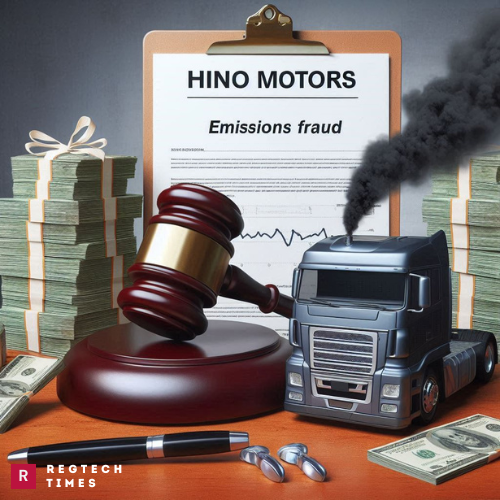Hino Motors Ltd., a major Japanese vehicle manufacturer and a subsidiary of Toyota, has been sentenced by a U.S. court after admitting to a years-long scheme to cheat on emissions tests. The company was found guilty of manipulating emissions data for diesel engines that were imported and sold in the United States between 2010 and 2019.
In an official ruling, the U.S. District Court in Michigan ordered Hino to pay a staggering $1.6 billion in penalties. This includes a $521.76 million criminal fine and an additional $1.087 billion forfeiture money judgment. Additionally, the company will be on probation for five years, during which it is banned from importing any diesel engines it has manufactured into the U.S.
According to court documents, Hino engineers deliberately faked test results to make their diesel engines appear cleaner than they actually were. These fraudulent engines, which did not comply with U.S. environmental standards, were installed in over 105,000 trucks sold across the country.
Fraudulent Practices Gave Hino an Unfair Business Advantage
Hino’s deception allowed it to gain an unfair business advantage over competitors, including American companies that followed strict emissions regulations. By submitting false test data, the company was able to sell its engines in the U.S. without making the necessary improvements to meet environmental standards. This generated over $1 billion in revenue while harming both American consumers and the environment.
Investigators discovered that Hino engineers altered emissions test data and even fabricated results without running any real tests. The fraud involved falsified carbon dioxide emission data, which led to incorrect fuel efficiency ratings for Hino’s diesel engines. Additionally, the company failed to disclose hidden software functions that negatively impacted the engines’ emissions control systems.
Theia Group Executives Face Charges in 250 Million Fraud Case
The fraudulent practices extended over nearly a decade, with Hino selling engines that produced higher levels of pollution than what was legally allowed under the U.S. Clean Air Act. These illegal emissions contributed to air pollution, which can cause serious health issues such as respiratory diseases and environmental damage.
U.S. Authorities Crack Down on Environmental Violations
U.S. authorities emphasized the seriousness of Hino’s actions and stressed the need for corporate accountability. Officials stated that the company not only violated emissions laws but also smuggled illegal goods into the country by falsely claiming that the engines met environmental standards.
The massive financial penalties imposed on Hino serve as a warning to other companies that might consider violating environmental laws. The five-year probation period will require Hino to implement a strict compliance and ethics program, ensuring that similar misconduct does not happen in the future. The company will also be subject to ongoing monitoring and reporting to regulatory authorities.
The case was investigated by federal agencies specializing in environmental crimes, and experts believe this ruling marks one of the largest penalties ever imposed for emissions fraud. Authorities made it clear that companies engaging in fraudulent activities will face serious consequences, including hefty fines and import bans.
Hino’s fraudulent conduct highlights the dangers of corporate deception and its impact on consumers, businesses, and the environment. This case reinforces the importance of honesty and transparency in the automotive industry, ensuring that vehicles sold in the market meet the required environmental and safety standards.


